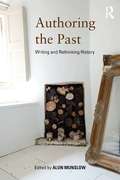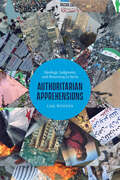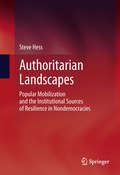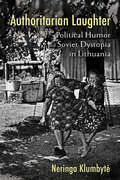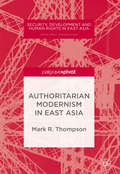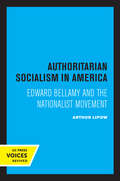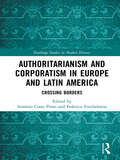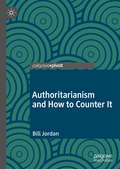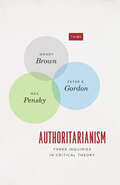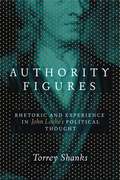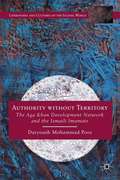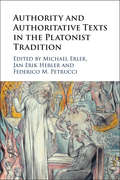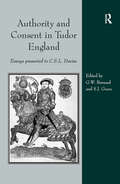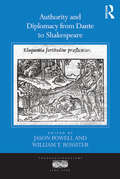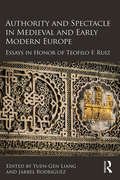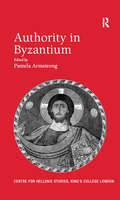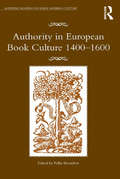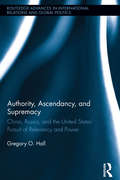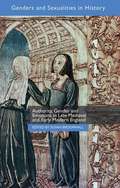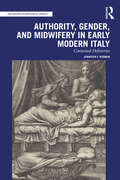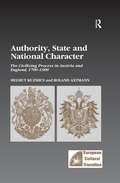- Table View
- List View
Authoring the Past: Writing and Rethinking History
by Alun MunslowPlease explain why you think about and write history as you do? Collecting together the responses to this question from 15 of the world’s foremost historians and theorists, Authoring the Past represents a powerful reflection on and intervention in the historiographical field. Edited by Alun Munslow and presented in concise digestible essays, the collection covers a broad range of contemporary interests and ideas and offers a rich set of reasoned alternative thoughts on our cultural engagement with times gone by. Emerging from an intensely fertile period of historical thought and practice, Authoring the Past examines the variety of approaches to the discipline that have taken shape during this time and suggests possible future ways of thinking about and interacting with the past. It provides a unique insight into recent debates on the nature and purpose of history and demonstrates that when diverse metaphysical and aesthetic choices are made, the nature of the representation of the past becomes a matter of legitimate dispute. Students, scholars and practitioners of history will find it a stimulating and invaluable resource.
Authoritarian Apprehensions: Ideology, Judgment, and Mourning in Syria (Chicago Studies in Practices of Meaning)
by Lisa WedeenIf the Arab uprisings initially heralded the end of tyrannies and a move toward liberal democratic governments, their defeat not only marked a reversal but was of a piece with emerging forms of authoritarianism worldwide. In Authoritarian Apprehensions, Lisa Wedeen draws on her decades-long engagement with Syria to offer an erudite and compassionate analysis of this extraordinary rush of events—the revolutionary exhilaration of the initial days of unrest and then the devastating violence that shattered hopes of any quick undoing of dictatorship. Developing a fresh, insightful, and theoretically imaginative approach to both authoritarianism and conflict, Wedeen asks, What led a sizable part of the citizenry to stick by the regime through one atrocity after another? What happens to political judgment in a context of pervasive misinformation? And what might the Syrian example suggest about how authoritarian leaders exploit digital media to create uncertainty, political impasses, and fractures among their citizens? Drawing on extensive fieldwork and a variety of Syrian artistic practices, Wedeen lays bare the ideological investments that sustain ambivalent attachments to established organizations of power and contribute to the ongoing challenge of pursuing political change. This masterful book is a testament to Wedeen’s deep engagement with some of the most troubling concerns of our political present and future.
Authoritarian Landscapes: Popular Mobilization and the Institutional Sources of Resilience in Nondemocracies
by Steve HessThe turbulent year of 2011 has brought the appearance of mass popular unrest and the collapse of long lived autocratic regimes in Egypt, Tunisia, Libya and possibly Syria. The sudden and unanticipated fall of these regimes - often thought of as exemplars of authoritarian resilience - has brought much of the conventional wisdom on the durability and vulnerability of nondemocratic regimes into question. This book seeks to advance the existing literature by treating the autocratic state not as a unitary actor characterized by strength or weakness but rather as a structure or terrain that can alternatively inhibit or facilitate the appearance of national level forms of protests. In the mode of the Arab Spring, the color revolutions of the former Soviet Union, and the people power movement of the Philippines, such movements overcome the daunting impediments presented by autocrats, appeal to likeminded counterparts across society, and overwhelm the ability of regimes to maintain order. Conversely, in other settings, such as contemporary China, decentralized state structures provide an inhospitable environment for national-level protest, leading collective actors to opt for more local and parochial forms of contention. This outcome produces paradoxical situations, such as in the PRC, where protests are frequent but national-level mobilization and coordination is absent.
Authoritarian Laughter: Political Humor and Soviet Dystopia in Lithuania
by Neringa KlumbytėAuthoritarian Laughter explores the political history of the satire and humor magazine Broom published in Soviet Lithuania. Artists, writers, and journalists were required to create state-sponsored Soviet humor and serve the Communist Party after Lithuania was incorporated into the Soviet Union in 1940. Neringa Klumbytė investigates official attempts to shape citizens into Soviet subjects and engage them through a culture of popular humor. Broom was multidirectional—it both facilitated Communist Party agendas and expressed opposition toward the Soviet regime. Official satire and humor in Soviet Lithuania increasingly created dystopian visions of Soviet modernity and were a forum for critical ideas and nationalist sentiments that were mobilized in anti-Soviet revolutionary laughter in the late 1980s and early 1990s. Authoritarian Laughter illustrates that Soviet Western peripheries were unstable and their governance was limited. While authoritarian states engage in a statecraft of the everyday and seek to engineer intimate lives, authoritarianism is defied not only in revolutions, but in the many stories people tell each other about themselves in jokes, cartoons, and satires.
Authoritarian Modernism in East Asia (Security, Development and Human Rights in East Asia)
by Mark R. ThompsonFollowing Barrington Moore Jr., this book raises doubts about modernization theory’s claim that an advanced economy with extensive social differentiation is incompatible with authoritarian rule. Authoritarian modernism in East Asia (Northeast and Southeast Asia) has been characterized by economically reformist but politically conservative leaders who have attempted to learn the “secrets” of authoritarian rule in modern society. They demobilize civil society while endeavoring to establish an “ethical” form of rule and claim reactionary culturalist legitimation. With China, East Asia is home to the most important country in the world today that is rapidly modernizing while attempting to remain authoritarian.
Authoritarian Party Structures and Democratic Political Setting in Turkey
by Pelin Ayan MusilConducting a comparative case study among four parties in the Turkish political system, this study shows how the variance in interest configurations and the power resources of local party activists constitute these changing patterns.
Authoritarian Socialism in America: Edward Bellamy and the Nationalist Movement
by Arthur LipowIn Authoritarian Socialism Arthur Lipow raises important issues about the nature of democracy and defines the intellectual roots of the authoritarian side of the socialist tradition in America and distinguishes it from democratic socialism. This title is part of UC Press's Voices Revived program, which commemorates University of California Press’s mission to seek out and cultivate the brightest minds and give them voice, reach, and impact. Drawing on a backlist dating to 1893, Voices Revived makes high-quality, peer-reviewed scholarship accessible once again using print-on-demand technology. This title was originally published in 1982.
Authoritarianism and Corporatism in Europe and Latin America: Crossing Borders (Routledge Studies in Modern History)
by Federico Finchelstein António Costa PintoWhat drove the horizontal spread of authoritarianism and corporatism between Europe and Latin America in the 20th century? What processes of transnational diffusion were in motion and from where to where? In what type of ‘critical junctures’ were they adopted and why did corporatism largely transcend the cultural background of its origins? What was the role of intellectual-politicians in the process? This book will tackle these issues by adopting a transnational and comparative research design encompassing a wide range of countries.
Authoritarianism and How to Counter It
by Bill JordanAfter the collapse of the Soviet Union, it was assumed that liberal democracies would flourish worldwide. Instead, today authoritarian leaders are gaining power – from Trump’s US and Bolsonaro's Brazil to Orban's Hungary – while Russia and China have turned back towards their old, autocratic traditions. This book examines the origins and implications of this shift, and focusses especially on the longstanding coercion of poor people. As industrial employment, and now also many service jobs, are being replaced through technological innovations, state-subsidised, low-paid, insecure work is being enforced through regimes of benefits cuts and sanctions. Authoritarians are exploiting the divisions in the working class that this creates to stoke resentment against immigrants and poor people. The author identifies new social movements and policies (notably the Universal Basic Income) which could counter these dangers.
Authoritarianism: Three Inquiries in Critical Theory (TRIOS)
by Wendy Brown Peter E. Gordon Max PenskyThree distinguished scholars draw on critical theory to address the causes and circumstances behind the rise of autocracies and oligarchies.Across the Euro-Atlantic world, political leaders have been mobilizing their bases with nativism, racism, xenophobia, and paeans to “traditional values,” in brazen bids for electoral support. How are we to understand this move to the mainstream of political policies and platforms that lurked only on the far fringes through most of the postwar era? Does it herald a new wave of authoritarianism? Is liberal democracy itself in crisis?In this volume, three distinguished scholars draw on critical theory to address our current predicament. Wendy Brown, Peter E. Gordon, and Max Pensky share a conviction that critical theory retains the power to illuminate the forces producing the current political constellation as well as possible paths away from it. Brown explains how “freedom” has become a rallying cry for manifestly un-emancipatory movements; Gordon dismantles the idea that fascism is rooted in the susceptible psychology of individual citizens and reflects instead on the broader cultural and historical circumstances that lend it force; and Pensky brings together the unlikely pair of Tocqueville and Adorno to explore how democracies can buckle under internal pressure.These incisive essays do not seek to smooth over the irrationality of the contemporary world, and they do not offer the false comforts of an easy return to liberal democratic values. Rather, the three authors draw on their deep engagements with nineteenth—and twentieth—century thought to investigate the historical and political contradictions that have brought about this moment, offering fiery and urgent responses to the demands of the day.“A brilliant and urgent assessment of democracy’s current crisis and capitalism’s increasing authoritarianism. . . . a profound diagnosis of this moment’s political ills.” —Astra Taylor, author of Democracy May Not Exist, but We’ll Miss It When It's Gone
Authorities for Military Operations Against Terrorist Groups: The State of the Debate and Options for Congress
by Christopher S. Chivvis Andrew M. LiepmanU.S. counterterrorism operations rely on authorizations established in 2001 and 2002. This report surveys the debate over the requirements for a new congressional authorization for the use of military force against terrorist groups and examines the current terrorist challenge, the purposes and key elements of such legislation, and options for Congress.
Authority
by Frank FurediWhere schools in the past used to introduce young people to the norms and values of society, today it seems that schools are there primarily to deal with students' difficult behavior. The school has become a course in Life Skills. Students have to be taught to control their behavior. This shift in priorities has been fed largely by experts in education and other fields, and in so doing they have often pitted schools against parents. This is one of the dangers of the trend, but this kind of therapeutic education also leaves insufficient time and resources for teachers to intellectually stimulate their students.
Authority Figures: Rhetoric and Experience in John Locke's Political Thought
by Torrey ShanksIn Authority Figures, Torrey Shanks uncovers the essential but largely unappreciated place of rhetoric in John Locke’s political and philosophical thought. Locke’s well-known hostility to rhetoric has obscured an important debt to figural and inventive language. Here, Shanks traces the close ties between rhetoric and experience as they form the basis for a theory and practice of judgment at the center of Locke’s work. Rhetoric and experience come together, for Locke, to reorient readers’ relation to the past in order to open up alternative political futures. Recognizing this debt sets the stage for a new understanding of the Two Treatises of Government, in which the material and creative force of language is necessary for political critique.Authority Figures draws together political theory and philosophy, the history of science and of rhetoric, and philosophy of language and literary theory to offer an interpretation of Locke’s political thought that shows the ongoing importance of rhetoric for new modes of critique in the seventeenth century. Locke’s thought offers up insights for rethinking the relationship of rhetoric and experience to political critique, as well as the intersections of language and materialism.
Authority Figures: Rhetoric and Experience in John Locke's Political Thought
by Torrey ShanksIn Authority Figures, Torrey Shanks uncovers the essential but largely unappreciated place of rhetoric in John Locke’s political and philosophical thought. Locke’s well-known hostility to rhetoric has obscured an important debt to figural and inventive language. Here, Shanks traces the close ties between rhetoric and experience as they form the basis for a theory and practice of judgment at the center of Locke’s work. Rhetoric and experience come together, for Locke, to reorient readers’ relation to the past in order to open up alternative political futures. Recognizing this debt sets the stage for a new understanding of the Two Treatises of Government, in which the material and creative force of language is necessary for political critique.Authority Figures draws together political theory and philosophy, the history of science and of rhetoric, and philosophy of language and literary theory to offer an interpretation of Locke’s political thought that shows the ongoing importance of rhetoric for new modes of critique in the seventeenth century. Locke’s thought offers up insights for rethinking the relationship of rhetoric and experience to political critique, as well as the intersections of language and materialism.
Authority Without Territory
by Daryoush Mohammad PoorExamining the connection between the concept of authority and the transformation of the Ismaili imamate, Authority without Territory is the first study of the imamate in contemporary times. With a particular focus on Aga Khan, the 49th hereditary leader of Shi'a Imami Ismaili Muslims, Daryoush Mohammad Poor shows how the Ismaili imamate surpasses the barriers and restrictions of the Weberian ideal-types and represents a novel image of a Shi'i Muslim community that has successfully adapted to modernity without losing its essential values or ethical commitments. Including interviews with key figures in the intellectual and administrative arms of the Ismaili imamate, this book sheds light on how these institutions develop and the challenges they face.
Authority and Authoritative Texts in the Platonist Tradition
by Federico M. Petrucci Michael Erler Jan Erik Heßler Michael McoskerAll disciplines can count on a noble founder, and the representation of this founder as an authority is key in order to construe a discipline's identity. This book sheds light on how Plato and other authorities were represented in one of the most long-lasting traditions of all time. It leads the reader through exegesis and polemics, recovery of the past and construction of a philosophical identity. From Xenocrates to Proclus, from the sceptical shift to the re-establishment of dogmatism, from the Mosaic of the Philosophers to the Neoplatonist Commentaries, the construction of authority emerges as a way of access to the core of the Platonist tradition.
Authority and Consent in Tudor England: Essays Presented to C.S.L. Davies
by G.W. BERNARD; S.J. GUNNBrought together as a tribute to the distinguished Tudor historian C.S.L. Davies, the essays in this collection address key themes in the current historiography of the Tudor period. These include the nature, causes and consequences of change in English government, society and religion, the relationship of centre, localities and peripheral areas in the Tudor state, the regulation of belief and conduct, and the dynamics of England's relations with her neighbours. The contributors, colleagues and students of Cliff Davies, are all leading scholars who have provided fresh and interesting essays reflecting the wide ranging inquisitiveness characteristic of his own work. They seek to cross as he has done the traditional boundaries between the medieval and early modern periods and between social, political and religious history. A coherent collection in their own right, these essays, by showing the many new directions open to those studying the Tudor period, provide a fitting tribute to such an influential scholar.
Authority and Diplomacy from Dante to Shakespeare (Transculturalisms, 1400-1700)
by Jason Powell William T. RossiterA detailed examination of the relationship between the discourses and practices of authority and diplomacy in the late medieval and early modern periods, Authority and Diplomacy from Dante to Shakespeare interrogates the persistent duality of the roles of author and ambassador. The volume approaches its subject from a literary-historical perspective, drawing upon late medieval and early modern ideas and discourses of diplomacy and authority, and examining how they are manifested within different forms of writing: drama, poetry, diplomatic correspondence, peace treaties, and household accounts. Contributors focus on major literary figures from different cultures, including Dante, Petrarch, and Tasso from Italy; and from England, Chaucer, Wyatt, Sidney, Spenser, and Shakespeare. In addition, the book moves between and across literary-historical periods, tracing the development of concepts and discourses of authority and diplomacy from the late medieval to the early modern period. Taken together, these essays forge a broader argument for the centrality of diplomacy and diplomatic concepts in the literature and culture of late medieval and early modern England, and for the importance of diplomacy in current studies of English literature before 1603.
Authority and Spectacle in Medieval and Early Modern Europe: Essays in Honor of Teofilo F. Ruiz
by Jarbel Rodriguez Yuen-Gen LiangBringing together distinguished scholars in honor of Professor Teofilo F. Ruiz, this volume presents original and innovative research on the critical and uneasy relationship between authority and spectacle in the period from the twelfth to the sixteenth centuries, focusing on Spain, the Mediterranean and Latin America. Cultural scholars such as Professor Ruiz and his colleagues have challenged the notion that authority is elided with high politics, an approach that tends to be monolithic and disregards the uneven application and experience of power by elite and non-elite groups in society by highlighting the significance of spectacle. Taking such forms as ceremonies, rituals, festivals, and customs, spectacle is a medium to project and render visible power, yet it is also an ambiguous and contested setting, where participants exercise the roles of both actor and audience. Chapters in this collection consider topics such as monarchy, wealth and poverty, medieval cuisine and diet and textual and visual sources. The individual contributions in this volume collectively represent a timely re-examination of authority that brings in the insights of cultural theory, ultimately highlighting the importance of representation and projection, negotiation and ambivalence.
Authority in Byzantium (Publications of the Centre for Hellenic Studies, King's College London)
by Pamela ArmstrongAuthority is an important concept in Byzantine culture whose myriad modes of implementation helped maintain the existence of the Byzantine state across so many centuries, binding together people from different ethnic groups, in different spheres of life and activities. Even though its significance to understanding the Byzantine world is so central, it is nonetheless imperfectly understood. The present volume brings together an international cast of scholars to explore this concept. The contributions are divided into nine sections focusing on different aspects of authority: the imperial authority of the state, how it was transmitted from the top down, from Constantinople to provincial towns, how it dealt with marginal legal issues or good medical practice; authority in the market place, whether directly concerning over-the-counter issues such as coinage, weights and measures, or the wider concerns of the activities of foreign traders; authority in the church, such as the extent to which ecclesiastical authority was inherent, or how constructs of religious authority ordered family life; the authority of knowledge revealed through imperial patronage or divine wisdom; the authority of text, though its conformity with ancient traditions, through the Holy scriptures and through the authenticity of history; exhibiting authority through images of the emperor or the Divine. The final section draws on personal experience of three great ’authorities’ within Byzantine Studies: Ostrogorsky, Beck and Browning.
Authority in European Book Culture 1400-1600 (Material Readings in Early Modern Culture)
by Pollie BromilowThrough its many and varied manifestations, authority has frequently played a role in the communication process in both manuscript and print. This volume explores how authority, whether religious, intellectual, political or social, has enforced the circulation of certain texts and text versions, or acted to prevent the distribution of books, pamphlets and other print matter. It also analyzes how readers, writers and printers have sometimes rebelled against the constraints and restrictions of authority, publishing controversial works anonymously or counterfeiting authoritative texts; and how the written or printed word itself has sometimes been perceived to have a kind of authority, which might have had ramifications in social, political or religious spheres. Contributors look at the experience of various European cultures-English, French, German and Italian-to allow for comparative study of a number of questions pertinent to the period. Among the issues explored are local and regional factors influencing book production; the interplay between manuscript and print culture; the slippage between authorship and authority; and the role of civic and religious authority in cultural production. Deliberately conceived to foster interdisciplinary dialogue between the history of the book, and literary and cultural history, this volume takes a pan-European perspective to explore the ways in which authority infiltrates and is in turn propagated or undermined by book culture.
Authority, Ascendancy, and Supremacy: China, Russia, and the United States' Pursuit of Relevancy and Power (Routledge Advances in International Relations and Global Politics)
by Gregory O. HallAuthority, Ascendancy, and Supremacy examines the American, Chinese, and Russian (Big 3) competition for power and influence in the Post-Cold War Era. With the ascension of regional powers such as India, Iran, Brazil, and Turkey, the Big 3 dynamic is an evolving one, which cannot be ignored because of its effect to not only reshape regional security, but also control influence and power in world affairs. How does one define a "global" or "regional" power in the Post-Cold War Era? How does the relationships among the Big 3 influence regional actors? Gregory O. Hall utilizes country data from primary and secondary sources to reveal that since the early 1990s, competition for influence and power among the Big 3 has intensified and could result in armed confrontation among the major powers. He assesses the state of affairs in each country’s economic, resource, military, social/demographic, and political spheres. In addition, events data, which focuses on international interactions, facilitates identifying trends in Big 3 interactions as well as their concerns and affairs with regional players. Opinion data, drawn from policy makers, scholarly interviews, and survey research data, identifies foreign policy interests among the Big 3, as well non-Big 3 foreign policy behaviors. With its singular focus on American, Chinese, and Russian interactions, policy interests, and behaviors, Authority, Ascendancy, and Supremacy represents a significant contribution for understanding and managing Post-Cold War conflicts and promises to be an important book.
Authority, Gender and Emotions in Late Medieval and Early Modern England
by Susan BroomhallThis collection explores how situations of authority, governance, and influence were practised through both gender ideologies and affective performances in medieval and early modern England. Authority is inherently relational it must be asserted over someone who allows or is forced to accept this dominance. The capacity to exercise authority is therefore a social and cultural act, one that is shaped by social identities such as gender and by social practices that include emotions. The contributions in this volume, exploring case studies of women and men's letter-writing, political and ecclesiastical governance, household rule, exercise of law and order, and creative agency, investigate how gender and emotions shaped the ways different individuals could assert or maintain authority, or indeed disrupt or provide alternatives to conventional practices of authority.
Authority, Gender, and Midwifery in Early Modern Italy: Contested Deliveries (The History of Medicine in Context)
by Jennifer F. KosminAuthority, Gender, and Midwifery in Early Modern Italy: Contested Deliveries explores attempts by church, state, and medical authorities to regulate and professionalize the practice of midwifery in Italy from the late sixteenth to the late eighteenth century. Medical writers in this period devoted countless pages to investigating the secrets of women’s sexuality and the processes of generation. By the eighteenth century, male practitioners in Britain and France were even successfully advancing careers as male midwives. Yet, female midwives continued to manage the vast majority of all early modern births. An examination of developments in Italy, where male practitioners never made successful inroads into childbirth, brings into focus the complex social, religious, and political contexts that shaped the management of reproduction in early modern Europe. Authority, Gender, and Midwifery in Early Modern Italy argues that new institutional spaces to care for pregnant women and educate midwives in Italy during the eighteenth century were not strictly medical developments but rather socio-political responses both to long standing concerns about honor, shame, and illegitimacy, and contemporary unease about population growth and productivity. In so doing, this book complicates our understanding of such sites, situating them within a longer genealogy of institutional spaces in Italy aimed at regulating sexual morality and protecting female honor. It will be of interest to scholars of the history of medicine, religious history, social history, and Early Modern Italy.
Authority, State and National Character: The Civilizing Process in Austria and England, 1700–1900 (Studies in European Cultural Transition #36)
by Roland Axtmann Helmut KuzmicsThis book presents a cross-disciplinary and methodologically innovative study, combining historical macro-sociology and a sociology of emotions with historical anthropology and cultural studies. Drawing on the concepts and theories of Norbert Elias on the Civilizing Process, it sets out to pin down and compare qualities that are simultaneously instantly recognisable and highly elusive, that is a kind of typical 'Englishness' and of 'Austrianness' that developed contemporaneously in the period up to the First World War. The authors chart the development of political authority structures in their varied historical manifestations, as well as their affective sedimentation as collective habitus ( national character ), comparing England and Austria from 1700 to 1900 as a case study. Their argument is based on an analysis of literary sources, mainly novels and plays, applying a sociology of literature approach. Axtmann and Kuzmics argue that the very different national characters formed in England and Austria during this time are related to differences in the affective experience of power and powerlessness, in short, of authority. They show that the formation of national character is determined partly by the different mixture of authoritative external constraints and milder self-restraint, and partly by the affective experience of human beings in uneven power balances. Specifically, they show how the formation of the bureaucratic state with strong patrimonial features in Austria, and of a self-organizing civil society with strong bourgeois-liberal features in England resulted both in different institutional structures of authority, and in different modes of the affective experience of this authority. Employing empirical detail of individual cases and texts to analyse and illuminate broad processes, the authors reach a clearer and deeper understanding of seemingly intangible and irrational aspects of national identity.
